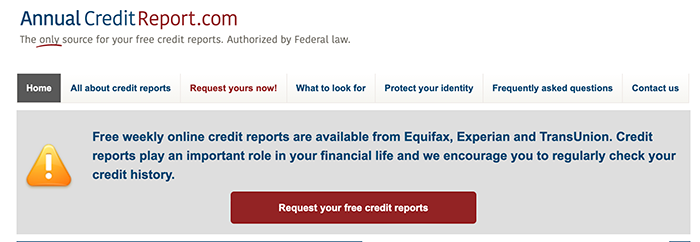Why Haven’t Loan Officers Been Told These Facts?
In Case You Missed It, CRA’s Permanently Extend Free Weekly Credit Reports
Are you obsessed with credit reports? Good news. The Consumer Reporting Agencies (CRAs) have permanently granted consumers free weekly access to their credit reports. Unlike the free annual credit report disclosure required under the Fair Credit Reporting Act (FCRA), this generous weekly access is not due to any specific legal requirement or law change. Instead, the CRAs, possessed by some strange and benevolent spirit towards consumers, have voluntarily made free access a lasting benefit.
Benevolence and magnanimity from the CRAs? Unfortunately, this Scrooge-like conversion may be just another fairy tale. It might be cynical to say, but when have the CRAs, or, for that matter, any big companies, acted kindly toward anyone when it was not in their interests to do so?
Remember, consumer interactions with CRAs, or lack thereof, continue to be the number one source of consumer complaints at the CFPB.
These unique organizations have immense power and insights into consumer behaviors. Privacy concerns aside, these outfits can single-handedly derail careers, destroy homeownership opportunities, and drive up credit costs for those whose reputations are unduly smeared by these unruly titans. It is no wonder the CRAs are striving for a public makeover.
Don’t Make Any Significant Purchases Without Checking Your Credit Report First! A CRA Trojan Horse?
The LOSJ may be skeptical about this supposed CRA-benevolence (oxymoron), but what about ulterior motives? Check your credit report every week. No. The pitch should be more like, “Check your credit report before buying a home, insurance, or applying for a new job.” Oh yes. Financial advice from a CRA? Come on; that is like buying an expensive wristwatch from a guy in a trenchcoat standing on the street corner. This move is more likely a shrewd initiative to simultaneously get into the heads of potential buyers and assuage stakeholder hostility.
Consider, for a moment, how the CRAs might track consumer behavior related to frequent consumer credit disclosures. Consider how lenders evaluate credit inquiries. What could the CRAs discover about a consumer whose frequency of credit report access changes? What might that data reveal about discrete consumer behavior or consumer response to marketing campaigns?
Consumers repeatedly accessing their credit records could indicate any number of needs or opportunities—a home purchase or move in the immediate future, a new credit extension, or shopping for insurance are a few obvious things. Long before a mortgage lender pulls the consumer’s credit report, the CRAs can discern that a home purchase is brewing.
Assuming this consumer data is available for purchase, this data mine could be quite the resource for lenders.
The CRAs are leveraging their unique position to capitalize on consumer marketing efforts, data collection, and product development. 2024 will also be the year the CRAs break the FICO chokehold on mortgage credit scoring. Later this year, in the third or fourth quarter, the FHFA will likely greenlight the implementation of VantageScore 4 for FNMA and FHLMC sellers. The VantageScore company is a joint venture of the CRAs and has already made inroads into the nonconforming mortgage credit market.
On the other hand, a less cynical assessment of the CRAs is offered by Consumer Reports (of all persons). Aw, shucks, all we are saying, is give peace a chance.
Excerpted From Consumer Reports
“Consumer Reports praised the three major credit reporting agencies today for announcing that they are permanently extending to consumers free weekly access to their credit reports through AnnualCreditReport.com. CR has long called on Equifax, Experian, and TransUnion to make free access permanent so that consumers could more easily check their credit reports for errors.
The credit bureaus started providing free weekly access to credit reports during the pandemic, which was set to expire at the end of this year. CR launched a campaign over the past few years calling on the credit bureaus to make free access permanent and gathered nearly 50,000 signatures on a petition urging them to do so. CR is now launching a new petition to the credit bureaus calling on them to do more to address the increasing number of consumer complaints about mistakes on credit reports.
The Fair Credit Reporting Act
Under the Fair Credit Reporting Act (FCRA), the term “consumer reporting agency” means a consumer reporting agency that regularly engages in the practice of “assembling or, evaluating, and maintaining for the purpose of furnishing consumer reports to third parties” with bearing on a consumer’s credit worthiness, credit standing, or credit capacity.”
Free Annual Disclosure FCRA 15 USC §1681j. (a)(1)
Among other things, the Fair Credit Reporting Act requires that, without charge, all consumer reporting agencies (CRAs) shall disclose to consumers, upon request, all information in the consumer’s file at the time of the request once during any 12-month period. Under some circumstances, the FCRA requires the CRAs to provide additional free credit disclosures.
From the Federal Trade Commission
The three national credit reporting agencies — Equifax, Experian, and TransUnion — have permanently extended a program that lets you check your credit report at each of the agencies once a week for free.
Visit AnnualCreditReport.com to request free copies of your credit reports. Other sites may charge you or be fraudulent sites set up to steal your personal information.
By law, everyone is entitled to one free credit report every twelve months from each of the three credit reporting agencies. In 2020, soon after the COVID-19 pandemic upended the finances of millions of people, the three agencies announced they would temporarily make free reports available every week. The program was extended twice and is now permanent.
Why check your credit report? Your report shows things like how many credit cards and loans you have, whether you pay your bills on time, and whether any debts have been turned over to collections. Creditors, insurers, some employers, and other businesses use it to decide if they want to do business with you — and the terms they’ll offer you.
Mistakes, like accounts or bankruptcies that aren’t yours, can hurt your credit, increase how much you’ll have to pay to borrow money, and even derail your chances of getting a loan, insurance, a rental home, or a job. Mistakes can result from errors by businesses that report credit information to credit reporting agencies. They also can be a sign of identity theft. The sooner you spot a mistake, the sooner you can dispute the error or — if it results from identity theft — report it at IdentityTheft.gov.

Do you have a great value proposition you’d like to get in front of thousands of loan officers? Are you looking for talent?


BEHIND THE SCENES – FTC Amends Safeguards Rule to Require Non-Banking Financial Institutions to Report Data Security Breaches
Congress enacted the Gramm Leach Bliley Act (“GLBA”) in 1999. The GLBA provides a framework for regulating the privacy and data security practices of a broad range of financial institutions. Among other things, the GLBA requires financial institutions to provide customers with information about the institutions’ privacy practices and about their opt-out rights, and to implement security safeguards for customer information.
Subtitle A of Title V of the GLBA required the Commission and other Federal agencies to establish standards for financial institutions relating to administrative, technical, and physical safeguards for certain information. Pursuant to the GLBA’s directive, the Commission promulgated the Safeguards Rule in 2002. The Safeguards Rule became effective on May 23, 2003.
Because of increasing instances of cyber crimes involving identity theft and fraud stemming from electronic data breaches, the FTC has acted to put more teeth into the rule. Bear in mind, the CFPB has warned that a failure to comply with the FTC Safeguards Rule may violate the Consumer Financial Protection Act which can lead to very serious enforcement action. See the CFPB Circular at the link below. See the links to relevant LOSJ articles.
From the FTC
The Federal Trade Commission has approved an amendment to the Safeguards Rule that would require non-banking institutions to report certain data breaches and other security events to the agency.
The FTC’s Safeguards Rule requires non-banking financial institutions, such as mortgage brokers, motor vehicle dealers, and payday lenders, to develop, implement, and maintain a comprehensive security program to keep their customers’ information safe. In October 2021, the FTC announced it had finalized changes to the Safeguards Rule to strengthen the data security safeguards that financial institutions are required to put in place to protect their customers’ financial information. The FTC also sought comment on a proposed supplemental amendment to the Safeguards Rule that would require financial institutions to report certain data breaches and other security events to the Commission.
“Companies that are trusted with sensitive financial information need to be transparent if that information has been compromised,” said Samuel Levine, Director of the FTC’s Bureau of Consumer Protection. “The addition of this disclosure requirement to the Safeguards Rule should provide companies with additional incentive to safeguard consumers’ data.”
The amendment announced today requires financial institutions to notify the FTC as soon as possible, and no later than 30 days after discovery.
The Final Rule requires financial institutions to report notification events, defined as the unauthorized acquisition of unencrypted customer information, involving at least 500 customers to the Commission. The notice to the Commission must include: (1) the name and contact information of the reporting financial institution; (2) a description of the types of information that were involved in the notification event; (3) if the information is possible to determine, the date or date range of the notification event; (4) the number of consumers affected; (5) a general description of the notification event; and, if applicable, whether any law enforcement official has provided the financial institution with a written determination that notifying the public of the breach would impede a criminal investigation or cause damage to national security, and a means for the Federal Trade Commission to contact the law enforcement official. The notice must be provided electronically through a form located on the FTC’s website, https://www.ftc.gov.
The breach notification requirement becomes effective May 13, 2024.
Consumer Financial Protection Circular 2022-04
Tip of the Week – Diffusing Arguments
In any environment, conflict arising from disagreements between interested persons should be expected, especially when the stakes are high. But often, disagreements are unnecessarily destructive to relationships, the corporate esprit de corp, and ultimately, the ability to create value.
Intellectually, it is easy to appreciate that people have different perspectives or ways of seeing and interpreting things, which can be useful. But when conflict arises, many people tend to over-value their thinking and under-value the thinking of those they disagree with.
Handling conflict with grace might come naturally on your best day. For the conflict-savvy, you might even efficiently harness conflict to build better relationships, develop better products or services, and create valuable solutions. But the rest of the time, especially when a person rubs you the wrong way or you have a history with the person, the conflict becomes a contest of wills or, worse, an opportunity for harsh and damaging judgments.
Can conflict be positive? Yes, conflict can reduce blind spots and, at the same time, help build trust and respect with stakeholders.
A Quick Conflict Exercise
Consider the following propositions:
- I always have good ideas.
- I know more.
- I’m right.
- My experience is more relevant.
- I rarely make mistakes (and this is not one of those times!).
Pick one of the above propositions and write down an opposite meaning. For example, “I always have good ideas” becomes “I never have good ideas” or “I always have bad ideas.” Now transpose the pronoun “I” with “You.” Like this, “You never have good ideas,” or “You always have bad ideas.”
Say it out loud. How does that sound? Imagine actually saying that to a person with whom you disagree. This form of conflict is a zero-sum equation. If I am right, you must be wrong.
Do you conduct this zero-sum exchange when engaging in conflict? That message leads folks to feel undervalued and unsafe. When something you do or say causes people to feel diminished, metaphorically, you might get punched in the face if they think they are bigger than you. If they feel smaller than you, they may withdraw. When feeling marginalized, people manifest a range of reactions. Whatever the response, the other person’s feeling of marginalization does not improve your credibility, influence, or rapport with them.
The concern for the feelings of others does not mean you aren’t right. That is another matter. The point is to manage the conflict without destructive results.
Are you telling people, “You never have good ideas?” “You don’t know anything.” “You are wrong.” “Your experience/training/expertise is of little value.” You probably don’t use these exact words, but it could be the message the other person is getting.
So what to do? What or how to communicate more effectively?
Think about it.
